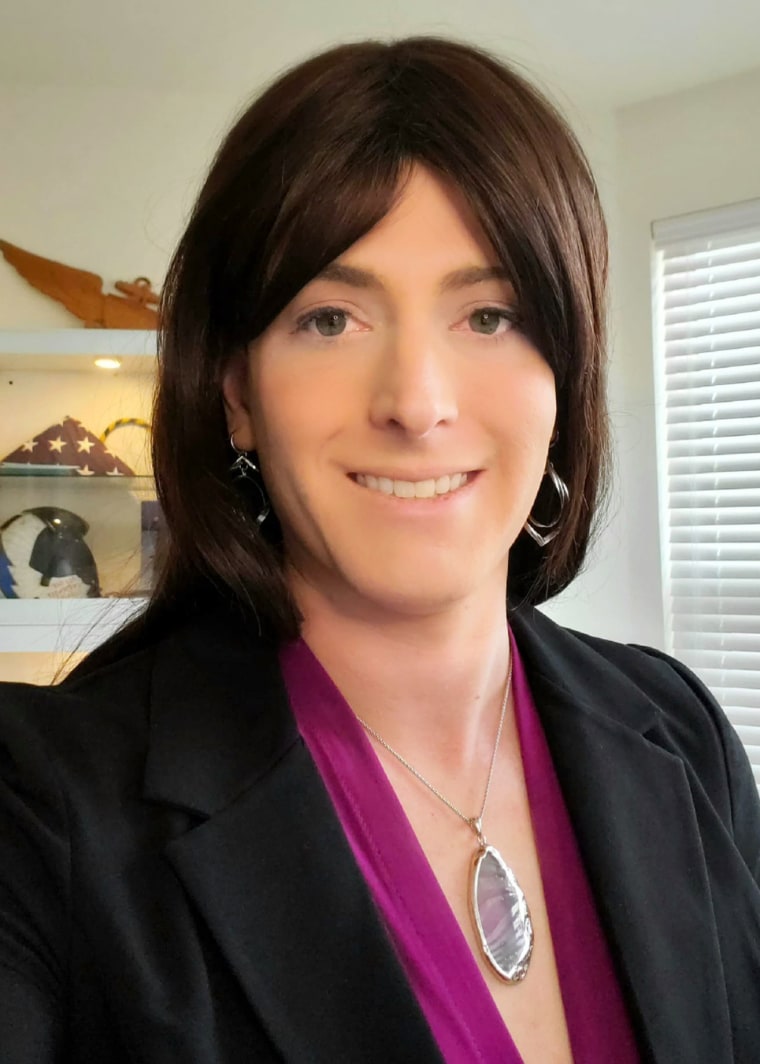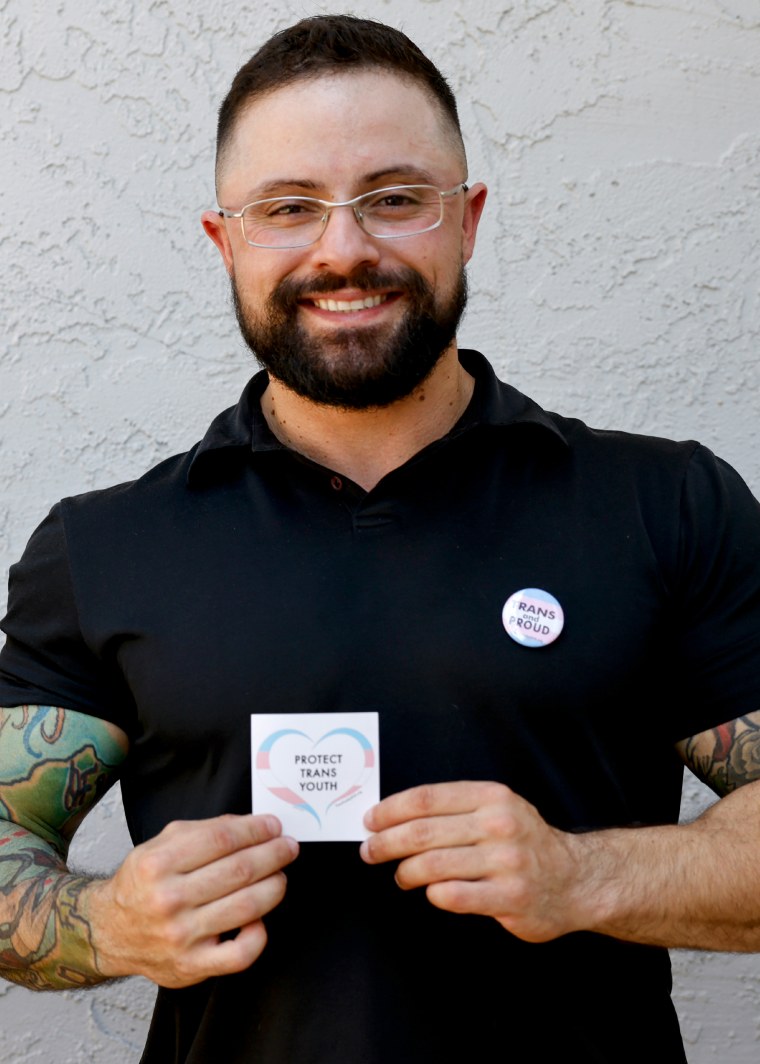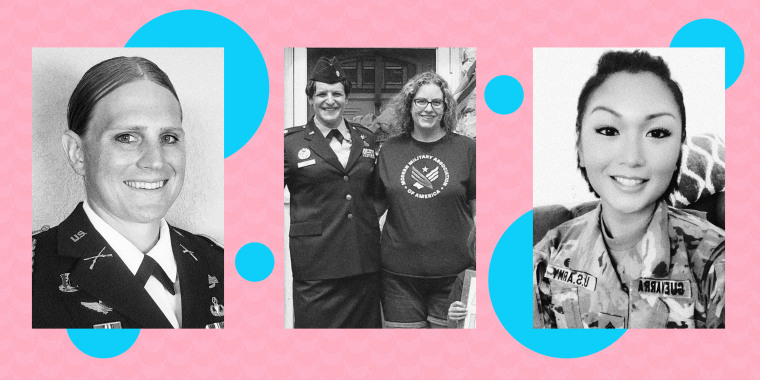Navy Lt. Cmdr. Emily Shilling came out as transgender on April 14, 2019, two days after a Trump administration policy barring trans people from serving openly in the military took effect.
The policy prevented trans people from enlisting, and it forced "non-exempt" service members like Shilling, who came out after the ban took effect, to continue serving as their assigned sex at birth.
"It was kind of like 'don't ask, don't tell,'" she said. "I could be whoever I wanted to be at home. I just couldn't do anything at work."
Shilling was depending on the outcome of the presidential election and President Joe Biden's executive order reversing the Trump administration's transgender military ban to continue her 15-year career. She said she has completed 60 combat missions and more than 1,700 hours as a pilot flying high-performance jets. Now, she oversees acquisitions for a fleet.
"I was committed to the Navy," she said. "I didn't know what I was going to do if the election went differently, if Biden wasn't putting out this executive order. I would probably have to be leaving the Navy, and they've invested 15 years in me. They've invested over $40 million in flight training and flight hours," she said.

The Trump administration had maintained that its policy wasn't a ban, because service members who wanted to transition and civilians who wanted to enlist were able to apply for waivers. But since the policy took effect, only one waiver has been granted, according to CNN. Shilling said that she had friends who applied for waivers but that they were jeopardizing their careers and their retirements. Many of them had served about 15 years, as she had, and to receive lifetime monthly retirement benefits, you have to serve for at least 20.
"You have to decide that you're more important than your career, which is unfortunate, given our core values: honor, courage, commitment," Shilling said.
Biden fulfilled a campaign promise when he issued an executive order Monday reversing the Trump administration's policy and allowing transgender people to serve openly again.
"I now feel safe to continue my career, to give return on investment of the 15 years that I've already given the Navy and that they've given me," Shilling said.
Serving openly will allow her to step into more senior leadership roles and be herself at work. She will be able to change her name, wear makeup if she would like and get the health care she needs. The messaging of Trump's executive order, she said, "put us in a not worthy group," so with the reversal, she hopes her command will support her and she'll have more recourse if she faces harassment.
"I've fully transitioned outside of the Navy," Shilling said. "Now it's time to start the process where I don't have to take one hat off and put a new one on to go into work."
Advocates say people affected by the Trump administration's policy generally fell into one of three groups. There were the "exempt" transgender service members who received diagnoses of gender dysphoria before April 12, 2019, and were therefore grandfathered in, meaning they could continue to serve openly and transition as their medical providers deemed necessary. Then there were the "non-exempt" trans service members who, like Shilling, came out or received diagnoses of gender dysphoria after the policy took effect and were therefore unable to change their names at work or get access to transition care other than therapy. Last, there were the transgender civilians who wanted to enlist in the military but couldn't.
Now that the ban has been reversed, trans service members and civilians are figuring out what comes next. Biden directed the secretaries of defense and homeland security to update him in 60 days about their progress implementing the order, but it's unclear just how soon a new policy will take effect.
'Your very existence is the issue'
For exempt service members who were serving openly before the ban, the challenge was "operating under this cloud of them being a burden as the official position of the military," said Lt. Col. Bree Fram, an astronautical engineer in the Air Force and vice president of the trans military group SPARTA.
"So despite what their units may think or despite what their commander may think, it's a challenge just to continue to go to work and get the job done in this environment where you're officially a challenge or a problem," Fram said. "Your very existence is the issue."
In June 2019, Trump cited the cost of medical care for transgender people as his reason for the ban, even though, Fram said, it makes up a tiny fraction of the Defense Department's overall health care budget. From 2016 to 2019, the cost of treating trans troops was about $8 million, or about 0.02 percent of the Pentagon's health care budget, according to data from the Defense Department.

The idea that trans people's care costs more singled them out "as a special class" for no reason, Fram said. Cisgender service members could get access to hormone therapy for medical reasons if necessary, but transgender service members who came out after the ban couldn't. "It was the singling out for special treatment that really had no rationale," Fram said.
The singling out had an effect on military culture, too, said retired Staff Sgt. Adrianna Guevarra, who worked in IT for the Army.
Guevarra, who was serving openly before the ban, said that her command was very supportive but that she experienced more hostility from some of her peers after Trump announced the ban on Twitter. She said that in 2017, while they were training in Hawaii, some other service members said it would be a "security threat" for her to use the women's bathroom. The situation "got really bad," she said, so her superiors designated a single bathroom at battalion headquarters just for her.

"It was all the way downstairs, and it was, like, four floors," Guevarra said. "So every time I had to use the bathroom or I had to change" for physical training, "I would go down to the bathroom and change, come back up, and that's just not ideal, especially if you're in a position where you're needed as quick as possible."
Overall, however, transgender service members — both those who have been serving openly and those who haven't — reported overwhelmingly positive experiences, despite the Trump administration's claims that the presence of trans service members negatively affected "cohesion" and "readiness."
"As for affecting cohesion, my peers, seniors, everybody are also upset that I'm not allowed to transition," Sgt. Liam Aguirre, a physical therapy technician based at Fort Carson, Colorado, said about his unit's sentiment before the ban was lifted.
Aguirre, like Shilling, is non-exempt. "It's been more of a burden not allowing people to be who they are and not allowing people to actually just be the best that they can be," Aguirre said.
Fram came out June 30, 2016, the same day the Obama administration announced that it would permit transgender people to serve openly in the military. Fram said that shortly after the announcement, she came out in a Facebook post and in an email to her colleagues.
"I was a little hesitant," Fram said. She said that she was uncertain what the impact would be but that she hit send anyway and then headed to the Pentagon gym, where she went "faster than I ever" had before on the elliptical machine.
She said that when she returned to her desk, she was overwhelmed by the in-person and Facebook responses.
"It was nothing but love and support, but even more so, it was my colleagues who, one by one, walked over to my desk, shook my hand and said, 'It's an honor to serve with you,'" she said. "I was floored."
'The clouds parted'
Some trans civilians, like Kaycen Bradley, 22, who lives in San Bruno, California, have been waiting years to enlist. Before Trump reinstated the ban, the Obama administration policy required trans people who wanted to enlist to be stable in their gender for at least 18 months before enlistment.
Bradley had planned to enlist in the Marine Corps in August 2019, which would have been 18 months after his last medical procedure. But the ban took effect in April.
"At that point, I was just devastated, because ... I only had a few more months to go," Bradley said. "That's all I had left, and ... it definitely broke my spirits a little bit."
Since then, he's been working in a gym, training and keeping in touch with military recruiters. His desired branch has changed — once Biden's reversal takes effect, he plans to enlist in the Army — but his desire to be part of the military hasn't wavered.
"I want to try to be the first one that actually gets to go in," Bradley said. "Just because I've been waiting for so long. So ... this is going to be pretty big."

Paulo Batista, 36, who lives in San Diego and works in technical maintenance, said the day Biden issued his executive order reversing the ban, "it was just like the clouds parted." He wants to join the Navy or Air Force and become an information technician or an aviation technician in aeronautics.
"I love to tinker with everything, and it's just a passion," he said. "To do it in uniform, it would just be me living my dream on a daily basis, getting to do what I like, getting to learn and work with a group of people that, you know, when you join the military, they have your back."
Shilling wants Congress and the Biden administration to enact legislation to ensure that transgender Americans' ability to serve their country openly doesn't change "with the next administration or the whim of politics."
Until then, trans service members and hopeful enlistees say they will keep fighting for their right to serve. Army Maj. Kara Corcoran said she often hears people say trans people are joining the military "just so you can transition."
"No. I joined to serve my country, and that's what the rest of transgender service members did, as well," she said. "They joined to serve their country, because we love this country, and we're willing to fight for this country. And we're willing to fight for our right to fight for this country."

